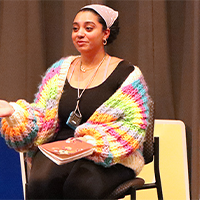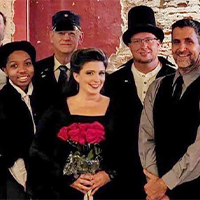by Chris Hilburn-Trenkle
Advancing Equity. Transforming Systems. Improving Lives.
Alexandra Rose had her eye on the Rotary Peace Fellowship for some time when she came across the University of North Carolina at Chapel Hill School of Social Work’s website.
When she saw the School of Social Work’s mission statement, she realized she had found exactly what she was looking for.
Rose will graduate in May with her Master of Social Work degree from UNC and a graduate certificate in International Peace and Conflict Transformation from Duke University as a Rotary Peace Fellow recipient, an award given annually for students interested in conflict resolution and peace to pursue a master’s degree at various institutions around the world.
During her academic and professional career, she’s also helped people on location all over the world, from South America to Asia to Europe. Yet her experience in social work came purely from a professional aspect rather than through academic experience before arriving in Chapel Hill.
After growing up in Australia, Rose received undergraduate degrees in international relations and social science from the University of Queensland and Queensland University of Technology. She spent multiple years working in Nauru, an island nation northeast of Australia, to develop a trauma prevention-based intervention to help play a part in the healing process of 2,500 asylum seekers displaced from Sub-Saharan Africa and the Middle East.
During that time, she worked alongside many social workers who had earned their MSW. As she became more invested in her work, her passion for social work grew. She began reading about social work in her free time, quickly realizing she wanted to pair that reading with a formal education in the practice.
“It came to a point in my career where I did need to make that choice in order to keep doing the kind of work I wanted to do and to be seen as responsive to the needs of the people I was working with, looking for social work support, essentially,” Rose said.
That work involves collaborating with museums to, as she puts it, “Help empower social justice change and human empathy.” Although she’s worked on projects with museums in Australia and New Zealand, it was her work at the World Cultures Gallery at the National Museums Liverpool in the United Kingdom over the summer of 2023 that led to a research project for which she’s received international recognition.
She’s since shared the project with various conferences and museums, including the University of Cambridge’s Heritage and Colonialism Discussion Group in November, at the Commonwealth Association of Museums 2024 Triennial Conference in March in Auckland, New Zealand, and with social work students at UNC during a lecture later that month.
Rose’s work involved helping the museum find ways to move forward with decolonizing its collections. In the United Kingdom, many of the ethnographic and anthropological collections were acquired through colonialism and were often “stolen or looted or traded,” according to Rose. Her results included a systems mapping methodology that was used for object repatriation.
“It was such a perfect place for social work,” Rose said. “Any social worker would have found lots of things to do in that particular space. I found a systems mapping project that I thought would be useful for the collection and they agreed, and so that’s the project that came out of my 12 weeks there.”
Rose hopes to become “embedded into an institution,” whether that means working for UNESCO or with a museum to promote restorative healing practices and help institutions, communities and individuals feel a sense of belonging through the work they do.
Before she sets off on that journey, she’ll serve as the keynote speaker for the Rotary International Convention in Singapore for a presentation focusing on trauma-informed care in international development. By the time she walks across the stage to begin her lecture, she’ll have earned her MSW, something that fills her with sadness as well as joy.
“I have had the most incredible two years,” Rose said. “It’s been a highlight of my personal and professional life in very clear, obvious ways. It’s so obvious to me how much I loved this experience. To think of it is a finite experience brings up a lot of emotions to me, including a lot of sadness because the resources and support that I’ve had are unparalleled to any other experience I’ve had in my life.”
Related Stories

Harambee celebration returns to UNC School of Social Work
After a three-year hiatus, students from the University of North Carolina School of Social Work “all pulled together” to bring back one of the School’s beloved traditions — Harambee.

UNC School of Social work alum Katherine Loflin is using the tools she learned at UNC to make a big impact in communities around the world.

